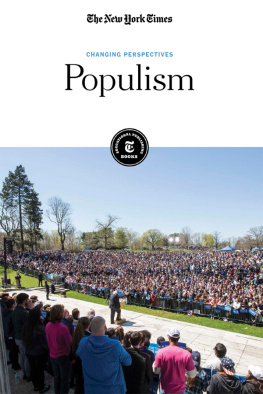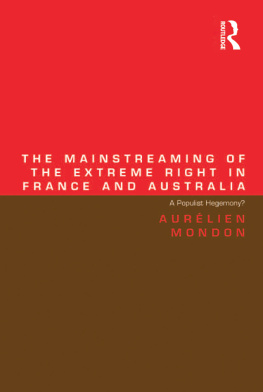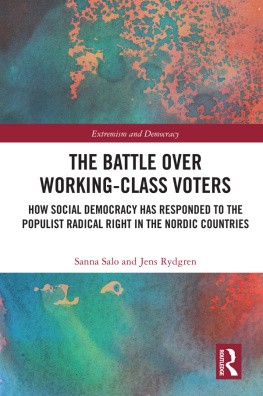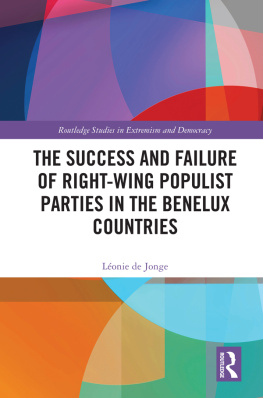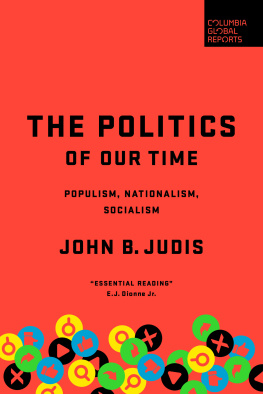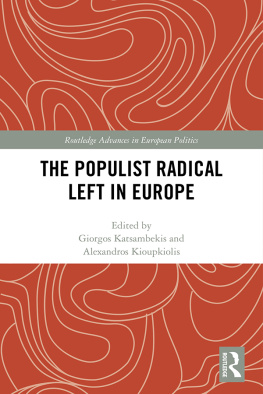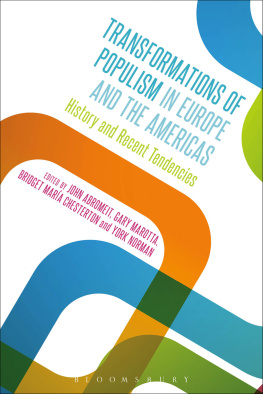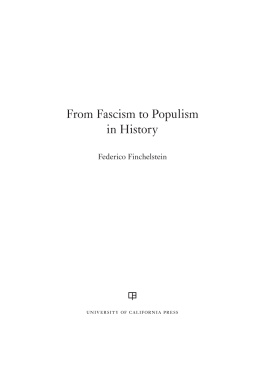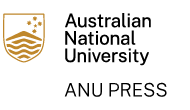Populist Conservative Movements in Australia and New Zealand During the Great Depression
This title is published under a Creative Commons Attribution-NonCommercial-NoDerivatives 4.0 International (CC BY-NC-ND 4.0).
The full licence terms are available at creativecommons.org/licenses/by-nc-nd/4.0/legalcode
This book is published under the aegis of the Social Sciences Editorial Committee of the ANU Press.
Acknowledgements
I commenced the thesis upon which this book is based in mid-2010. The timing seemed uncannythe world was still recovering from a financial crisis popularly deemed to be the worst since the Great Depression, and right-wing parties and movements seemed to be on the rise in several countries. I was particularly struck by the similarities between the populist conservative movements that arose in Australia and New Zealand during the Depression and the contemporary Tea Party protests in the United States. Yet by the time I finished in early 2015, the sharp edge of this phenomenon seemed to have worn offa sign, I hoped, that the passing of the GFC might remove the sense of crisis from our politics.
Then came Brexit, Trump, Bolsonaro. The right-wing backlash against the huge numbers of Middle Eastern asylum seekers seeking refuge in Europe from the Syrian conflict. The rise of the alt-right, of identitarianism. The Unite the Right rally in Charlottesville, the Charleston church attacks. The murder of 51 innocent Muslims in Christchurch by an extreme right terrorist. Suddenly, and tragically, my thesis seemed very relevant again. The populist conservative movements I examined did not commit such atrocities, but they represented a similar period of political radicalisation in our history that few people are aware of.
Transforming my thesis into a manuscript has only increased the number of people I am indebted to. Then, as now, the first and foremost place must be reserved for my partner Helen. You have always supported me in everything I do, even when its led me to spend too many evenings in front of my computer when I should have been with you. As with all things, this book would not have happened without you. Nor without our daughter Abigail for that matter, who desperately makes me want our generation to do better. Thank you also to my parents and family, who ceaselessly encouraged me and were unfortunate enough to have had a draft chapter or two land in their laps at some point in time.
And to my friends, who have at various points discussed my thesis with me and provided valuable ideas and insights, thank you. Particular thanks must go to Malcolm McKinnon, who is infinitely generous with his time and advice; to Christopher Burke, whose work on James Courage spurred me to come up with my core argument; and to Tristan-Cordelia Egarr, Ross Webb and Shirley Jones, who provided valuable feedback on the introduction to this book. Thank you also to all of those in Australia who let me stay with you during my three-month research trip in 2011Mum, Dad, Doug, Sonja, Rachael and Mary. You made the time away from Helen bearable.
Thank you to my thesis supervisors as well, who always knew just the right balance between giving me free rein and checking in on me. Jim McAloon, Giacomo Lichtner, Kate Hunteryou each guided me at various points and challenged me to think about things in new ways. To Jim in particular, my primary supervisor, I remain eternally amazed and grateful for your encyclopedic knowledge of New Zealand and Australian history and your extensive familiarity with the historiography. Any time I had a question about secondary literature, you instantly pointed me to the foremost experts. Thank you also to Victoria University of Wellington and the history program itself, which provided me with the resources to complete my thesis. If it hadnt been for your generous scholarship, this book would never have come to be.
I am indebted to the archivists at the various libraries I visited in Australia and New Zealand. You made my research trips that much more productive. I would particularly like to acknowledge the JC Beaglehole Room at Victoria University of Wellington, the State Library of New South Wales, and the National Libraries of Australia and New Zealand for several of the images I have used in this book.
Every effort has been made to determine the copyright status of the images reproduced in this book, to seek permissions where required, and to include the appropriate acknowledgements. While most were out of copyright, it proved impossible to conclusively determine the status of a few of the old and orphaned items. If notified of any errors or omissions I will be pleased to rectify them at the earliest opportunity.
I am also indebted to the descendants of prominent figures in this book who gave me permissionand often invited me into their homesto view the papers left behind by their tupuna. To Fiona and Joan Begg, Pamela Durrant, Jim Barclay, Bruce Meachen, Jen and Johnny Ormond, Paul Harper, Susan Lucina, Sandy Bathgate, Helen and Angus De Salis, David Treloar, Rosemary Farrow, Mark Alford, Marion Smith, Max Ellis, and Helen Sutchthank you for placing your trust in me.
I would also like to acknowledge all of the staff and associates of ANU Press who shepherded me through my first (but hopefully not my only) book. Frank Bongiorno, Richard Reid, Emily Tinker, the external peer reviewers, Jan Borrie (copyeditor extraordinaire), and everyone elsethank you for the time and resources you devoted to bringing this book to fruition. The end product is all the better for it.
And finally, thank you to Sooty (our cat) for constantly reminding me that, if I cant eat it, play with it or sleep on it, its probably not that important.
Introduction
On 30 January 1931, the editor of TheArgusa widely circulated, conservative-leaning Melbourne newspaperissued an editorial titled A Call to Citizenship. It was 15 months after Black Friday, the stock market crash of October 1929 that is generally viewed as the start of the Great Depression. The ripple effects of that crash wreaked havoc on the global economy. For Australia and New Zealand, which depended heavily on the export of primary products, the effects were devastating. With no clear end in sight, the editor of



